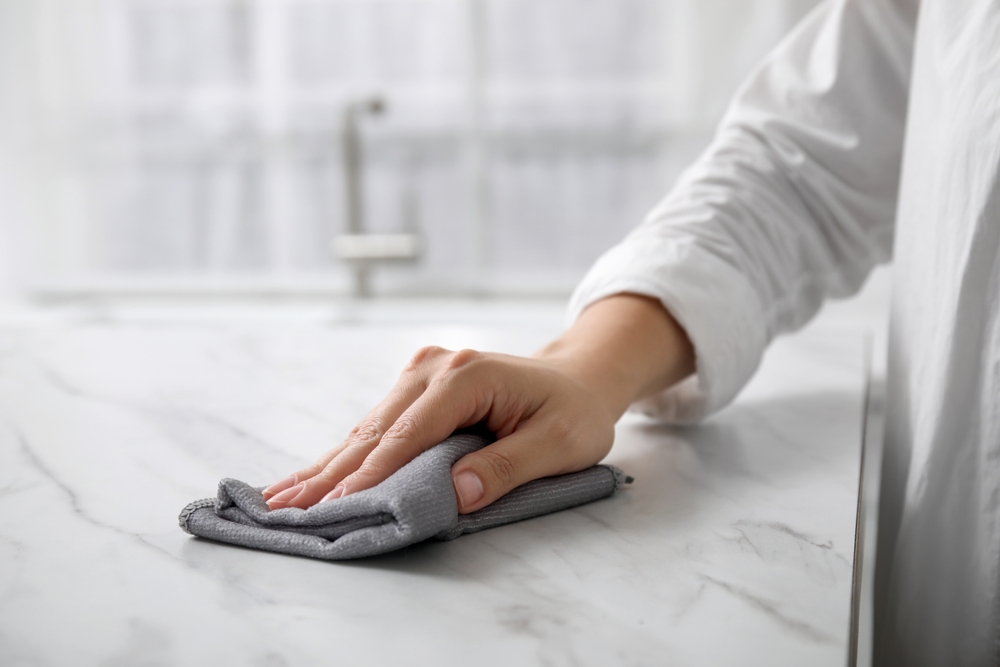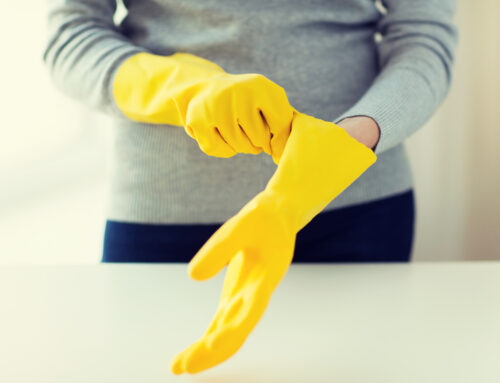Welcome to the world of countertops, where granite and marble reign supreme. These two materials are highly prized for their beauty, durability, and versatility. They can be used in any room of the house, from the kitchen to the bathroom, and they provide a timeless elegance that never goes out of style.
However, owning granite or marble countertops also means taking care of them. Regular cleaning and maintenance are crucial to keeping them looking their best. But with so many cleaning products and techniques available, it can be challenging to know where to start. That’s why we’ve put together these top tips for cleaning your granite and marble countertops!
Use a Soft Cloth:
When it comes to cleaning granite and marble countertops, the type of cloth you use is crucial. As mentioned, using an abrasive cloth or scrub brush can scratch the surface of the stone, leaving unsightly marks and potentially damaging the sealant. That’s why using a soft cloth is essential.
Microfiber cloths are a popular choice for cleaning granite and marble countertops. These cloths are made from tiny fibers that are 100 times thinner than a human hair. Because of their small size, microfiber cloths are able to trap dirt and dust, making them more effective at cleaning than traditional cotton cloths. They’re also gentle on the surface of the stone, so you don’t have to worry about scratching the countertop. Additionally, microfiber cloths don’t leave behind lint or streaks, which can be unsightly and difficult to remove.
Another option for cleaning your countertops is to use a soft sponge. Make sure the sponge is damp, but not soaking wet, as too much moisture can damage the sealant. You can also use a non-abrasive brush, such as a soft-bristled toothbrush or a specialized stone cleaning brush. Again, make sure the brush is gentle and won’t scratch the surface of the stone.
When choosing a cloth or sponge, avoid using anything that’s too rough or abrasive. Avoid materials like steel wool or scouring pads, which can scratch the surface of your countertops. You should also avoid using any cloths or sponges that have been previously used with harsh chemicals, as they can leave behind residue that can damage the sealant.
Avoid Harsh Chemicals:
Granite and marble are natural stones that are composed of minerals that can be damaged by harsh chemicals. Chemicals that are too acidic or alkaline can react with the minerals in the stone and cause etching, discoloration, or other forms of damage. That’s why it’s important to avoid using harsh chemicals when cleaning your granite or marble countertops.
Some common household cleaners that should be avoided include bleach, ammonia, and vinegar. Bleach is highly alkaline and can damage the sealant on your countertops, causing it to break down over time. Ammonia is also alkaline and can react with the minerals in the stone, causing it to become dull or discolored. Vinegar is acidic and can etch the surface of the stone, leaving unsightly marks.
Instead of using harsh chemicals, opt for gentle cleaning solutions that are pH-neutral and specially formulated for granite and marble countertops. These cleaners are designed to clean and protect your countertops without causing any damage. They’re typically made from natural ingredients like plant extracts or minerals and are free from harsh chemicals and synthetic fragrances.
When choosing a cleaner, make sure to read the label carefully to ensure that it’s safe for use on granite and marble. Look for cleaners that are specifically formulated for natural stone surfaces and are pH-neutral. Some popular pH-neutral cleaners include Granite Gold Daily Cleaner, StoneTech All-Purpose Cleaner, and Method Daily Granite Cleaner.
If you prefer to use a homemade solution, you can create a gentle cleaner by mixing warm water with a few drops of dish soap. This solution is safe for use on granite and marble and won’t damage the sealant or leave behind any residue.
Wipe Up Spills Immediately:
Spills are an inevitable part of daily life, but they can be especially problematic for granite and marble countertops. Because these surfaces are naturally porous, liquids can seep into the stone and cause staining, etching, or other forms of damage. That’s why it’s important to wipe up spills immediately to prevent any damage from occurring.
Even water can cause damage if it’s left on the surface of the stone for too long. Water spots can form if the water evaporates, leaving behind mineral deposits that can be difficult to remove. To avoid water spots and other types of damage, it’s best to wipe up spills as soon as they happen.
When cleaning up spills:
Use a soft cloth or paper towel to absorb the liquid. Don’t use any abrasive materials, such as steel wool or scrub brushes, as these can scratch the surface of the stone. Once you’ve absorbed as much of the spill as possible, wipe the surface clean with a soft cloth.
It’s important to avoid letting spills sit for more than a few minutes, as this can increase the likelihood of damage. Acidic substances like lemon juice, vinegar, and tomato sauce are especially problematic, as they can etch the surface of the stone if left for too long. If you spill any acidic substance, it’s important to wipe it up immediately to prevent any damage from occurring.
If you do end up with a stain on your granite or marble countertop, don’t panic. There are several products and techniques that can help to remove stains and restore the surface of the stone. One popular method is to make a paste using baking soda and water and apply it to the stain. Let the paste sit for several hours or overnight, then rinse it off with warm water and dry the surface thoroughly.
Use a pH Neutral Cleaner:
A pH-neutral cleaner is an essential component of a granite or marble countertop cleaning routine. As mentioned earlier, harsh chemicals and acidic or alkaline solutions can damage the surface of these natural stones, making it important to use a pH-neutral cleaner that is safe and effective for use on granite and marble surfaces.
pH-neutral cleaners are specifically formulated to clean natural stone surfaces without causing any damage. These cleaners have a pH level of around 7, which is neutral and won’t react with the minerals in granite or marble. They are free from harsh chemicals, synthetic fragrances, and dyes, making them gentle on the surface of the stone while effectively removing dirt, grime, and stains.
When selecting a pH-neutral cleaner for your granite or marble countertops, it’s important to look for one that is specifically designed for natural stone surfaces. These cleaners are made with natural ingredients that won’t damage the sealant or leave behind any residue that can dull the shine of the stone.
There are several popular pH-neutral cleaners that are available on the market, including Granite Gold Daily Cleaner, StoneTech All-Purpose Cleaner, and Method Daily Granite Cleaner. Each of these cleaners has its own unique formula, but they all share the same key characteristics of being pH-neutral, safe for use on natural stone surfaces, and effective at removing dirt and stains.
It’s important to note that soap or dish detergent should be avoided when cleaning granite or marble countertops. These products can leave behind a film or residue that can dull the shine of the stone, making it appear hazy or cloudy. Instead, stick to pH-neutral cleaners that are specifically designed for use on natural stone surfaces.
Don’t Forget the Sealer:
Granite and marble are naturally porous stones, which means they have small openings in their surface that can allow liquids and stains to penetrate. To protect against these issues, it’s important to seal your countertops regularly.
Sealing your granite or marble countertops creates a protective barrier on the surface of the stone, helping to prevent liquids from penetrating and causing staining or etching. How often you need to seal your countertops depends on several factors, including the type of stone, the amount of use they get, and the type of sealer you use.
As a general rule of thumb, it’s recommended to seal your countertops once a year. However, it’s important to keep in mind that this can vary based on the above-mentioned factors. For example, if you have a light-colored marble that’s highly porous and gets a lot of use, you may need to seal it more frequently than once a year.
When selecting a sealer for your granite or marble countertops, it’s important to choose a high-quality product that’s specifically designed for use on these types of surfaces. Look for sealers that are made with natural ingredients and are free from harsh chemicals that could damage the stone. It’s also important to follow the manufacturer’s instructions for application, as improper application can result in an uneven or ineffective seal.
Before applying the sealer:
it’s important to thoroughly clean your countertops to ensure that there’s no dirt, debris, or residue on the surface of the stone. Once the countertops are clean and dry, apply the sealer in a thin, even layer using a clean, soft cloth or applicator. Be sure to follow the manufacturer’s instructions for the recommended drying time, as well as any other specific application instructions.
It’s also important to keep in mind that sealing your countertops is not a permanent solution, and the sealer will eventually wear off over time. You may notice that water or other liquids no longer bead up on the surface of the stone, which is a sign that it’s time to reapply the sealer.
Use a Granite Polish:
A granite polish is a great way to enhance the natural shine and luster of your countertops. In addition to improving the appearance of your countertops, a granite polish also provides an extra layer of protection against spills and stains.
A granite polish is designed to fill in any small scratches or imperfections on the surface of the stone, helping to create a smoother, more even appearance. It also helps to restore the shine and luster that can be lost over time due to normal wear and tear.
When selecting a granite polish for your countertops, it’s important to choose a product that’s specifically designed for use on granite or marble surfaces. Look for a polish that’s made with natural ingredients and is free from harsh chemicals that could damage the stone. It’s also important to follow the manufacturer’s instructions for application, as improper use can result in an uneven or ineffective polish.
To apply the polish:
Start by thoroughly cleaning your countertops with a pH-neutral cleaner and allowing them to dry completely. Once the countertops are dry, apply a small amount of polish to a soft cloth or applicator and work it into the surface of the stone in circular motions. Be sure to follow the manufacturer’s instructions for the recommended drying time, as well as any other specific application instructions.
Some popular granite polishes include Granite Gold Polish, Weiman Granite & Stone Polish, and TriNova Granite Sealer & Protectant. Each of these products has its own unique formula, but they all share the same key characteristics of being safe and effective for use on granite and marble surfaces.
It’s important to note that while a granite polish can help enhance the appearance of your countertops and provide an extra layer of protection, it’s not a substitute for regular cleaning and maintenance. You’ll still need to clean your countertops regularly and seal them as recommended to keep them looking their best.
Test Before You Clean:
It’s always a good idea to test a new cleaner or polish on a small, inconspicuous area of your countertops before using it on the entire surface. This will help you avoid any potential damage or discoloration. Apply a small amount of the cleaner or polish to an out-of-the-way spot, wait a few minutes, and then wipe it away with a soft cloth. If there are no adverse effects, you can proceed with cleaning the rest of the countertop.
Avoid Standing on Countertops:
Granite and marble countertops are strong and durable, but they’re not meant to support the weight of a person. Avoid standing or sitting on your countertops, as this can cause cracks or chips that can be expensive to repair. Also, be careful when placing heavy objects on your countertops, as they can cause damage over time.
Clean Regularly:
Regular cleaning is essential for maintaining the beauty and durability of granite and marble countertops. Wipe down the surface daily with a soft cloth to remove dirt and debris, and deep clean them at least once a week. You can use a pH-neutral cleaner or a homemade solution of warm water and a few drops of dish soap. Don’t forget to seal your countertops regularly and use a granite polish to keep them looking shiny and new.
In summary…
Cleaning and maintaining your granite or marble countertops is a simple process that requires a little bit of effort and care. By following these top tips and using the right products, you can keep your countertops looking their best for years to come. With regular cleaning, sealing, and polishing, your granite or marble countertops will continue to provide timeless elegance and durability that will enhance the beauty of your home. Remember to always use a soft cloth, avoid harsh chemicals, wipe up spills immediately, use a pH-neutral cleaner, don’t forget the sealer, use a granite polish, test before you clean, avoid standing on your countertops, and clean regularly. By taking these steps, you’ll be able to enjoy your beautiful countertops for years to come.






